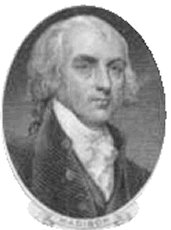Mr. Romney dragged out the old chestnuts about “In God We Trust” on the nation’s currency, and the inclusion of “under God” in the Pledge of Allegiance—conveniently omitting that those weren’t the founders’ handiwork, but were adopted in the 1950s at the height of McCarthyism. He managed to find a few quotes from John Adams to support his argument about America’s Christian foundation, but overlooked George Washington’s letter of reassurance to the Jews in Newport, R.I., that they would be full members of the new nation.
He didn’t mention Thomas Jefferson, who said he wanted to be remembered for writing the Declaration of Independence, founding the University of Virginia and drafting the first American law—a Virginia statute—guaranteeing religious freedom. In his book, “American Gospel,” Jon Meacham quotes James Madison as saying that law was “meant to comprehend, with the mantle of its protection, the Jew and the Gentile, the Christian and the Mahometan, the Hindoo and infidel of every denomination.”
The founders were indeed religious men, as Mr. Romney said. But they understood the difference between celebrating religious faith as a virtue, and imposing a particular doctrine, or even religion in general, on everyone. As Mr. Meacham put it, they knew that “many if not most believed, yet none must.”
Even now, Indians have to fight for their right to worship: on sacred sites held by the federal government, in ceremonies that use peyote, in prisons, etc.
For a debate on the separation of church and state, see Where the "Wall" Came From.


4 comments:
All this bloviating about the Constitution - what a friggin' joke! Why is it a joke? Because both parties support this: faith-based initiatives. Hypocrites one and all.
Why Public Funding Of "Faith-Based" Services Is Unconstitutional
Writerfella here --
And the US Army still holds Medicine Bluff, the sacred worship mountain of the Kiowa Tribe, away from the people themselves, the rationale being that it exists within the Ft. Sill base itself and that civilians shall not have such access. Now, just imagine what the outcry would be if the Kiowas forbade military access to the nearby St. Patrick's Mission which exists on tribal lands!
All Best
Russ Bates
'writerfella'
There is a committee that looks for military bases like that to close. I've not heard of Fort Sill before, but it seems to me that such a base would be a good candidate for closure. Or at least downsizing so they don't control/restrict the mountain anymore.
Writerfella here --
Ft. Sill is the oldest US military base in Oklahoma that still is in operation. It is a major recruit training site and the Army's artillery training center, with large tenant groups from the Navy and the Marines. Instead of being in danger of closing, it is expanding by some 35,000 troops (and families) from other US base closings by summer of 2008. The adjacent town of Lawton is amid a business and housing economic boom because of the expansion. An increase in civilian jobs on the post and higher attendances at the Kiowa, Comanche, and Ft. Sill Apache casinoes are in the offing...
All Best
Russ Bates
'writerfella'
Post a Comment